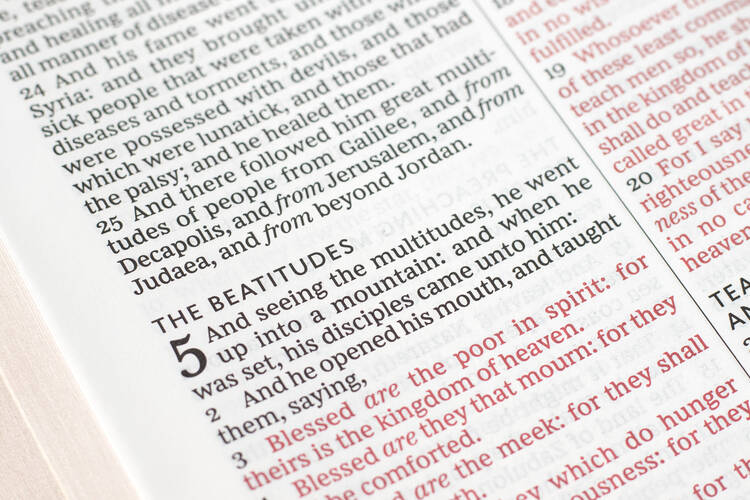Editor’s note: This is the fourth in a series of columns by James Keenan, S.J., on contemporary issues in moral theology.
I have argued in my last three columns that grief, vulnerability and recognition are the building blocks for teaching about the moral life. But we Christians can also turn to the Beatitudes in our search for true discipleship. They provide a course of training that develops our vulnerability so as to recognize the poor in spirit. In this sense, they are a remarkable guide to life.
In my own growth in understanding the Beatitudes, I have learned much from the late Yiu Sing Lúcás Chan, S. J., about the Beatitudes in The Ten Commandments and the Beatitudes: Biblical Studies and Ethics for Real Life. The Hong Kong-born Father Chan, who died in May 2015 of an apparent heart attack just a few weeks before his 47th birthday, was a gifted and widely published scholar of biblical ethics who taught at Marquette University.
Father Chan showed us that the Beatitudes have a much greater coherence than is normally acknowledged by insisting that they need to be read dynamically, in that each Beatitude builds one upon another; once we begin to take the first few steps, we realize that each successive step empowers the next. The steps are internally transformative. Like any notion of personal or communal growth, we really are not able to see where the program is taking us until we begin it. And it is only by heeding Father Chan’s admonition to climb this figurative ladder that we begin to see their internal connectedness and logic.
With this in mind let us begin with the Beatitudes as communicated in Chapter Five of the Gospel of Matthew.
The First Beatitude: Blessed are the poor in spirit, for theirs is the kingdom of heaven.
Matthew’s Beatitudes are singularly about learning to regard, recognize and respond to the poor in spirit. They direct our vision not toward introspection but to learning how to better look outwardly in vigilance for the poor in spirit. “Poor in spirit” refers not only to those who are poor in the sense of being bereft of life’s goods; they are poor in that they are also socially abandoned. They are the overlooked and disregarded, the ones whose poverty means that they have no one who responds to them, loves them or advocates for them. The poor in spirit are the least recognized people on earth.
As we ascend the training course of the Beatitudes, it is these poor in spirit whom we must gaze upon. They are the first and ultimate subjects whom we need to recognize.
The Second Beatitude: Blessed are they who mourn, for they shall be comforted.
The mourning in the second Beatitude is in fact directed to the poor in spirit in the first. Father Chan was mindful of those ethicists and preachers who think otherwise and try to claim that the Beatitude is a summons to mourn our own losses. Sounding like grief counselors, they suggest that if one denies one’s own grief, one will never know the comfort and happiness that follows.
But the object of the Beatitude’s mourning is not our own losses but those of the poor in spirit. The second Beatitude guides us to consider those in our community who, in their sensitive recognition of the poor in spirit, mourn them. Chan wrote that the Beatitude “is about a certain disposition that genuine disciples have with one another, such that if one suffers, the other mourns as well.” There is much to be learned by this practice of a studied mindfulness of another’s condition.
“In mourning, the self tries to identify with the other. Mourning is then the ready subordination of one’s own comfort and well-being to the suffering of others,” Father Chan added. “In this way, one allows one’s private life to be touched by the pain and suffering of the other.” Not until I fully grasp the loss of the poor in spirit can I resonate with them. By this mourning, we grow in vulnerability toward our neighbor and move to the third Beatitude.
The Third Beatitude: Blessed are the meek, for they shall inherit the earth.
Father Chan saw meekness as a transformative virtue that tempers those who are inclined to use their power to “save” the poor in spirit. Meekness finds its correlative in gentleness. Here he turned to Monika Hellwig’s astute observation in her article “The Blessedness of the Meek, the Merciful, and the Peacemakers” that the powerful “need to unlearn those patterns of behavior that control and dominate others” even when they want to help another. Father Chan and Dr. Hellwig highlighted that meekness helps the mighty to not condescend to the poor but to become capable of accompanying them instead. We need then not only to mourn the poor in spirit, we need to become as meek as they are so as to relate to them as they are.
Meekness allows the powerful to enter the community as a member instead of as its savior or leader; it allows the powerful to use their assets gently and compassionately—that is, truly in an other-directed way. It trains them to assist, but not from their positions of importance where they might think of themselves as morally superior. The third Beatitude calls all those who want to assist the poor to spend some time in learning meekness. The ladder of ascent helps us to become trained in the way of the Lord.
The ascent becomes empowering but through an inversion: We grow in power as we surrender it.
The Fourth Beatitude: Blessed are those who hunger and thirst for righteousness, for they will be filled.
With the Fourth Beatitude, the notion of the ladder of ascent leads us to see that the Beatitudes are indeed a training school for Christian discipleship. The exercises of fasting here are not public fasts to protest something but rather private actions that aim to transform the one who wants to empathetically mourn for the poor in spirit and who struggles to become meek.
In order to pursue these virtues, the disciple is now instructed to practice asceticism so as to become more capable of these virtues. By fasting, we learn to see the righteousness of empathy and meekness; this asceticism aims to develop within the exercitant a deeper hunger for God’s righteousness.
The Fifth Beatitude: Blessed are the merciful, for they will receive mercy.
Having recognized the poor in spirit, having mourned their condition, having sought to become meek in our encounter and having practiced prayer and fasting for their account, now at the Fifth Beatitude we are called to act. Mercy is the call, as I define it, to enter the chaos of another to respond to them in their need. Having ascended the ladder, we are at the point where we are finally capable of encountering the chaos of the poor in spirit.
Mercy is God’s way with humanity. Father Chan explained:
Creation is God’s merciful act that brings order into the chaos of the universe; the incarnation is God’s entry into the chaos of human existence; and the redemption is God’s mercy that delivers us from the chaos of slavery to sin … mercy is emphasized by Scripture as the condition for salvation. In short, God who is mercy first shows mercy to us.
Mercy is therefore the way of participating in God’s works, of being most like God in God’s ways, as Aquinas argued. By entering into affinity with God, by entering into the chaos of the poor in spirit, we enter into the world of God where mercy is exchanged. Thus, in being merciful, we receive mercy. Mercy is, if you will, its own reward.
The Sixth Beatitude: Blessed are the pure in heart, for they will see God.
The move from the practice of mercy in union with God leads to a new level of capacity in the ever-ascending disciple. A new level of integration has been given to the disciple such that the reconciling work of mercy lives now in an ongoing way in the disciple. A singularity of purpose allows us the freedom to be ourselves, reconciled from any temptation to become self-promoting or blind to the needs of others. In this integrity, we experience a reconciliation within ourselves. We are able to recognize the poor, mourn with them, meekly respond to them, practice asceticism so as to keep the poor on our horizon and finally to enter into their own chaos.
How does one maintain this integrity? Father Chan suggested the daily “examen of conscience,” as found in The Spiritual Exercises of St. Ignatius, because it “helps us to be more sensitive to the longings and sources of our own spirit and hence become more open to God.”
The Seventh Beatitude: Blessed are the peacemakers, for they will be called children of God.
Purity of heart is nothing short of the reconciliation of the conflicting motivations we may have had in attending to the poor in spirit. This Seventh Beatitude thus naturally follows from the sixth: Making peace within oneself, one now can become a peacemaker among others. This one disciple can now reconcile others to act together for the poor in spirit.
Father Chan noted that it is through peace that one can work for justice, for the peace that Christ speaks of is not simply the absence of conflict or the stability of order, but more importantly the capacity to reconcile others, so that they together can work for justice.
In effect, the peacemaker is the one whose integrity leads others in the work of justice for the poor in spirit. Father Chan highlighted that “an exegesis of the Greek and Hebrew terms for peace shows that peace is paralleled with ‘justice’” and is closer to the concept of righteousness than to that of tranquility or order.
The Eighth Beatitude: Blessed are those who are persecuted for righteousness’ sake, for theirs is the kingdom of heaven.
This Beatitude goes on to say “Blessed are you when people revile you and persecute you and utter all kinds of evil against you falsely on my account. Rejoice and be glad, for your reward is great in heaven, for in the same way they persecuted the prophets who were before you.”
Remembering that it is Christ who first aims our attention at the poor in spirit, Father Chan argued that the phrase ἕνεκεν ἐμοῦ (“on account of me”) “states clearly that the proper cause of persecution is Jesus and his teaching.” Additionally, he noted that the promise of the Eighth Beatitude, the Kingdom of Heaven, is the same as that of the first.
In forming an inclusio with the First Beatitude, this expanded Eighth Beatitude “sums up the basic thoughts and forms a high point for the ethical teaching of the whole Beatitudes,” Father Chan wrote. Able now to stand with the poor in spirit, we can now experience their world and Christ’s.
Insofar as the Beatitudes are a training course to fix our gaze on the poor in spirit, they also help us to become more fully realized disciples of Christ. By heeding the steps of the Beatitudes in recognizing the poor in spirit, we become more vulnerable to the other—the other who calls us further forward on the way of the Lord.
More columns from James F. Keenan, S.J.:
“What the disciples learned while grieving in ‘The Upper Room’”
“The great religious failure: not recognizing a person in need”
“Vulnerability isn’t weakness. It’s what makes us human—and able to love.”








